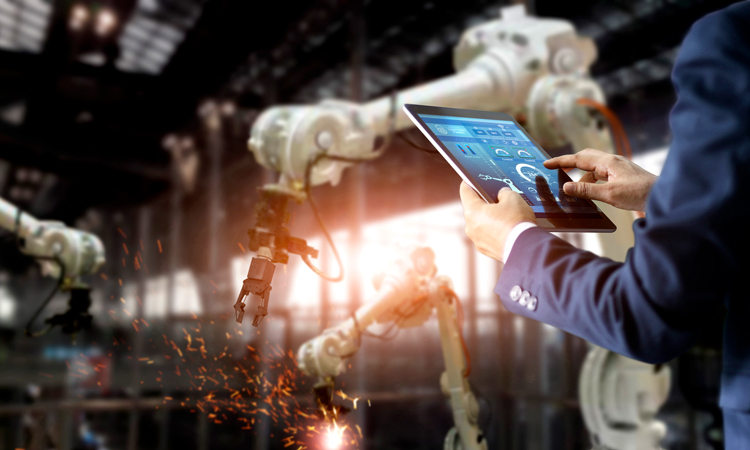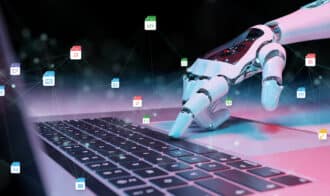 In manufacturing, implementation of AI solutions is rapidly increasing – a recent Forbes article claims that more than one-third of manufacturing executives say improved customer engagement and satisfaction are among the top benefits of an AI-driven manufacturing environment. With AI taking people out of the equation in other key industries like transportation and food production, it looks like the world could have a full-scale economic revolution on its hands. Research predicts that the global deep learning market will reach USD 28.83 Billion and expand at a CAGR of 48.4% during the forecast period of 2018-2023.
In manufacturing, implementation of AI solutions is rapidly increasing – a recent Forbes article claims that more than one-third of manufacturing executives say improved customer engagement and satisfaction are among the top benefits of an AI-driven manufacturing environment. With AI taking people out of the equation in other key industries like transportation and food production, it looks like the world could have a full-scale economic revolution on its hands. Research predicts that the global deep learning market will reach USD 28.83 Billion and expand at a CAGR of 48.4% during the forecast period of 2018-2023.
Is AI replacing jobs?
While this may be fantastic news for the executives whose job it is to obsess over their bottom line, the actual news is full of doom and gloom about the jobs AI will kill — self-driving cars and long-haul trucks, automated food kiosks, fruit pickers, and other use cases for AI that minimize human involvement. Andrew F. Puzder, chief executive of CKE Restaurants, recently gushed about the virtues of replacing people with robots to Business Insider: “They’re always polite, they always upsell, they never take a vacation, they never show up late, there’s never a slip-and-fall, or an age, sex or race discrimination case.” Whether you’re a long-haul trucker running beer across a five-state region, a copyeditor at a large publication, or a cashier at a fast food restaurant, it’s hard to read Puzder’s quote and not worry that robots are coming for your job. As AI and ML become ubiquitous in 2019, there’s a growing consensus that those taking a doom-and-gloom view of these technologies are only looking at one side of the coin. A recent World Economic Forum (WEF) report stated that, although 75 million jobs are expected to be displaced by deep learning technologies over the next three years, these same technologies are expected to create 133 million new roles, resulting in a net gain of 58 million new jobs. Another study predicted that AI, robotics, and smart automation technology could contribute up to $15 trillion to the global GDP by 2030.So what kinds of jobs will AI create?
In several industries, AI will simply reshape the kinds of jobs that are available. And in many cases, these new jobs will be more engaging than the repetitive tasks of the past. In manufacturing, workers who had previously been tied to the production line, watching for defective products all day long, can be redeployed in more productive pursuits — like improving processes by acting on insights gleaned from AI-based sensor and vision platforms. Of course, these are more specialized tasks and retraining or uptraining may be necessary for workers to effectively fulfill these new roles — something both companies and individuals will need to address sooner than later. AI-based solutions in any industry generate massive amounts of data, often from heterogeneous sources. Effectively harnessing the power of all this data requires human skills. Deep learning scientists have come to understand that context is critical for training effective machine learning algorithms— and humans are necessary to annotate this data to provide context in ambiguous situations and help cover all the real-world variations an AI system will encounter. To that end, Appen employs over 40,000 remote contractors a month to perform data annotation for our clients, drawing from a pool of over 1 million skilled annotators worldwide. These jobs wouldn’t exist without the deep learning technology that makes AI possible. As scientists and developers make huge advances in technology, businesses and workers may need to learn new technological skills to stay competitive.
AI-based solutions in any industry generate massive amounts of data, often from heterogeneous sources. Effectively harnessing the power of all this data requires human skills. Deep learning scientists have come to understand that context is critical for training effective machine learning algorithms— and humans are necessary to annotate this data to provide context in ambiguous situations and help cover all the real-world variations an AI system will encounter. To that end, Appen employs over 40,000 remote contractors a month to perform data annotation for our clients, drawing from a pool of over 1 million skilled annotators worldwide. These jobs wouldn’t exist without the deep learning technology that makes AI possible. As scientists and developers make huge advances in technology, businesses and workers may need to learn new technological skills to stay competitive.
AI is helping drive job creation in cybersecurity
As the global economy is increasingly digitized and automated, already-pervasive criminal enterprises – hackers, malware, and other threats – will grow exponentially, requiring developers, testers, and security experts to mitigate threats to vital public infrastructure and meet increasing individual identity concerns. In the past few years there has been a huge increase in cybersecurity job postings, many of which remain unfilled. With this shortage of cybersecurity professionals, most security teams have less time to proactively defend against increasingly sophisticated threats. This demand has created a crucial niche for workers to fill.The trickle-down effect of industry-wide digitalization
Indirectly, the efficiencies and opportunities that deep learning and automation enable for businesses have the potential to create millions of jobs. While automated delivery methods such as self-driving delivery trucks will take thousands of drivers off the road, a recent Strategy + Business article suggests that, “In a world where companies are increasingly judged on the quality of the customer experience they provide, you will need employees who can combine the skills of a customer service agent, marketer, and salesperson to sit in those trucks and engage with customers as they make deliveries.” Additionally, the higher productivity and positive growth enabled by AI will have a positive effect on hiring as companies will simply need to hire more workers to take on existing tasks that require very human skills. Think of customer service, copywriters, program managers, and other roles that require skills such as empathy, ethical judgement, and creativity.Developing new skills to survive and thrive
It’s easy to see why workers and executives alike might be reluctant to implement AI-powered automation. But as their competitors adopt this technology and begin to outpace them in sales, production, and innovation, it will require them to adapt. Both businesses and workers will need to invest in cultivating new technological skills to help them stay relevant in this data-driven landscape. If they can do this, the opportunities for business and professional growth are endless. —
Appen works with companies and governments worldwide to collect, create, and annotate training data for machine learning. Learn more about enhancing your data for AI and ML.
—
Appen works with companies and governments worldwide to collect, create, and annotate training data for machine learning. Learn more about enhancing your data for AI and ML. 










